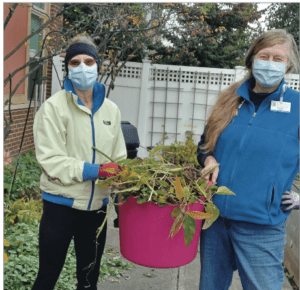By Deborah J. Benoit
Editor’s note: Deborah J. Benoit is a UVM Extension master gardener from North Adams, Massachusetts, who is part of Vermont’s Bennington County chapter.
Just because the growing season is over doesn’t mean work in the garden has come to an end. Almost, but not quite. There are still a number of chores that if done now will make you smile come spring.
If you haven’t already done so, bring any houseplants or tender perennial plants inside that you plan to overwinter. Pull dead and dying annuals from the garden, including vegetables and any tender perennials you aren’t going to overwinter indoors. Consider leaving flowers with seedheads in place until spring as food for the birds.

When putting the garden to bed for the winter, gardeners should pull up any dead and dying annuals, including vegetables and any tender perennials that won’t be over wintered indoors.
Weed for the last time this year. This is especially important if any of those unwelcome visitors have gone to seed. Remove the weeds, carefully disposing of the seedheads so the seeds aren’t spread around the garden to create a greater weed invasion next year.
Empty pots, clean and store them, particularly terracotta or ceramic pots, which may break due to stress from freezing.
Prune any damaged or diseased plant material, but resist the urge to prune spring and early summer flowering shrubs such as lilacs, forsythias and rhododendrons. If you do, you’ll be cutting off next year’s flowers.
If you don’t already have a compost pile, start one. Compost is a healthy addition to garden soil and an easy way to dispose of prunings, grass clippings and end-of-season annuals.
Avoid adding weeds, especially those that have gone to seed, to your compost. See The Dirt on Compost (go.uvm.edu/dirt) for more information on starting a compost pile and what materials should and should not be added to it.
Leave the leaves. Clearing paths and walkways of fallen leaves, and either shredding leaves in place or raking those on the lawn are necessary chores.
Consider leaving fallen leaves in your garden beds until winter has passed. Come spring, they’ll make a good addition to your compost bin. By leaving them in the garden now, you’re providing a place for pollinators and other beneficial insects to survive the winter.
If you have perennial flowers, shrubs or trees you didn’t get around to planting during the growing season, you can still plant them as long as the ground hasn’t yet frozen. Add a layer of mulch after the ground freezes.




